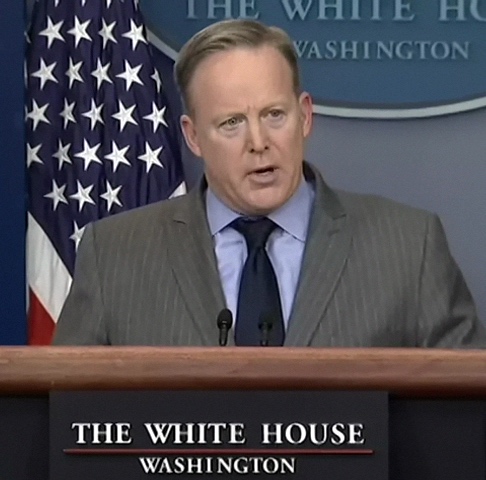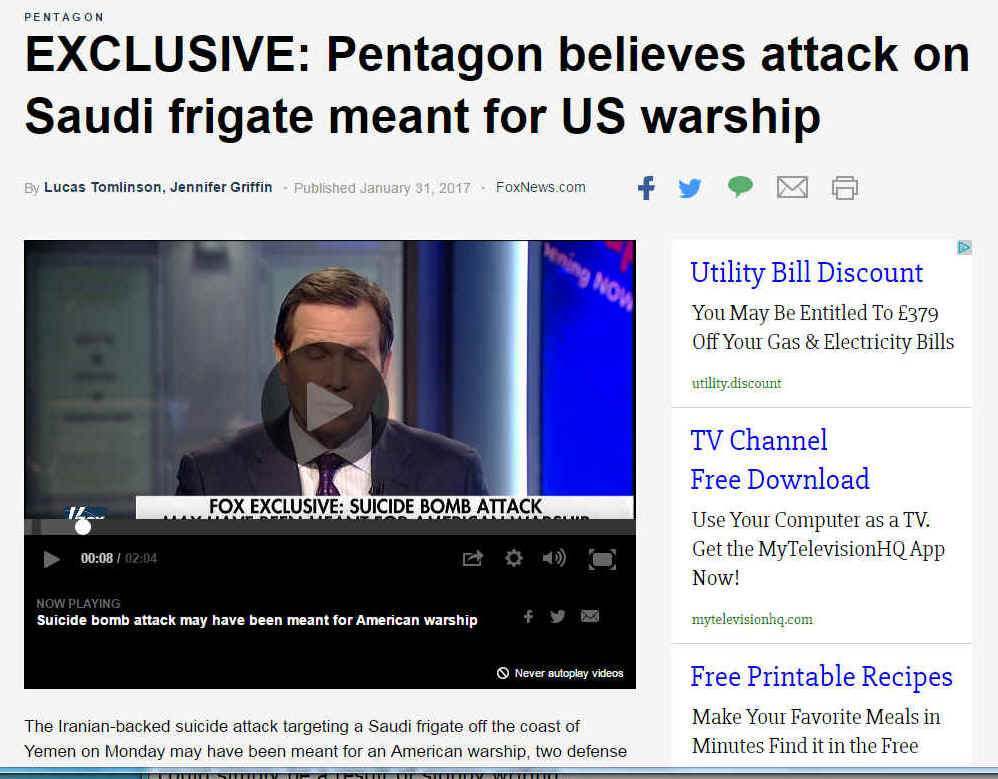
At a bizarre press conference yesterday, the Trump regime's chief spokesman falsely blamed Iran for an attack on an American warship – an attack that never happened.
The story behind this fictitious incident provides an object lesson in how anonymous sources, a gullible reporter, a news organisation devoted to pushing out propaganda and a White House press secretary who is a compulsive liar can lead to the creation of a dangerous myth.
This is how the myth evolved:
On Monday, Yemen's Houthis – who are at war with Saudi Arabia and its allies – hit a Saudi frigate in the Red Sea, killing two of its crew and reportedly causing light damage to the ship. The frigate had apparently been taking part in a naval blockade of Hodeida, a Yemeni port controlled by the Houthis.
Reporting from the Pentagon on Tuesday, Fox News journalist Jennifer Griffin cited unnamed officials as claiming the attack "may have been meant for an American warship" [italics added].
A Fox News TV presenter told viewers this "could have ominous implications for the US military" and the Fox News website hyped up the story further with a headline saying: "EXCLUSIVE: Pentagon believes attack on Saudi frigate meant for US warship" [italics added].

Neither Griffin nor Fox News bothered to question the truth or otherwise of this very dubious claim or presented any real evidence to support it. The claim appears to have been based on a video circulated by the Houthis following the attack. In the video a voice is heard shouting "Allahu akbar!" twice immediately after the explosion, followed by the Houthi slogan in Arabic: "Death to America, death to Israel, a curse on the Jews, victory to Islam".
This is the main slogan of the Houthi movement. They have been using it for years and if American intelligence analysts were unaware of it, they certainly ought to have been. Chanting it after the attack did not mean the Houthis thought they had hit an American warship, let alone an Israeli one.
Statements issued by the Houthis shortly after the attack also made clear they had known all along that the ship they were targeting was Saudi, not American.
On Thursday, the myth developed a stage further when Trump's communications director, Sean Spicer, wrongly asserted in a news conference that the warship hit by the Houthis was American and that it was attacked by Iran.
A day earlier, Trump's national security adviser, retired general Michael Flynn had announced that the White House was “officially putting Iran on notice” for carrying out a missile test. Asked about this at Thursday's news conference, Spicer replied:
“I think General Flynn was really clear yesterday that Iran has violated the Joint Resolution, that Iran’s additional hostile actions that it took against our Navy vessel are ones that we are very clear are not going to sit by and take.”
Sean Spicer on "Iran's additional hostile action that it took against our Navy vessel" from The Intercept on Vimeo.
The Intercept website reports that a journalist from CBS News then intervened to point out that it was actually a Saudi vessel and Spicer agreed: “Sorry, thank you, yes a Saudi vessel” but did not correct his false claim that it had been attacked by Iran.
The Trump regime seems eager for a confrontation with Iran, though its anti-Iranian rhetoric over the last few days may be partly intended to divert attention from the disastrous American raid on al-Qaeda hideout in Yemen which resulted in the death of a US serviceman, the loss of a helicopter and a large number of Yemeni civilian casualties.
On Sunday, Trump had an hour-long phone conversation with the Saudi king and, according to the Saudi government news agency, they had "identical" views on all the issues discussed, including "confronting those who seek to undermine security and stability in the region and interfere in the internal affairs of other states".
In doing so, they are both pursuing the familiar propaganda line that Yemen's Houthis are Iranians in disguise. Although the Houthis have Iranian support, the extent of that support is less than is often claimed. The Saudis, on the other hand, have a long history of extensive meddling in Yemen and in the current conflict their meddling is sustained with British and American weaponry.

 RSS Feed
RSS Feed
